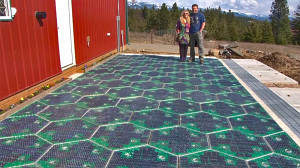
|
14A025 Innovation in the Coming ZGS by Jim Davies, 7/13/2014
It will be a central component of the coming Zero Government Society; innovation will drive competitive enterprise everywhere, with neither help nor hindrance. In offering services or goods for sale, you will strive to excel, to find a better and/or cheaper way to deliver. Human ingenuity will be released. Enormous prosperity will result. Here's one present-day example that just reached my notice: solar roads.
There are several obstacles. First, a form of glass needs still to be invented that will be abrasive enough to give good traction to tires, yet not to be scored by stones nor dimmed by accumulated deposits of rubber; yet meanwhile to be clear enough to focus light optically on the PV modules that need it. Then, the entire asphalt industry needs to agree to go out of the road-building business; yet they will, no doubt, employ lobbyists. Likewise all owners of existing power plants need also to surrender their livelihoods; and they, too, will be represented in the corridors of - er - power. No doubt there are many other hurdles; point is, roads and power plants are today massive industries dominated by huge companies, all of them controlled in the political arena, they will change their modus operandi only when it suits them, and can very readily call in the force of government to impose their will on anyone who disagrees. But take away government, and there will be nobody to lobby. Let roads revert to private, for-profit owners, and each will be eager to maximize his profits by honest provision of good service, not to keep "in" with his favorite politician. When the power industry can no longer call on government its cartel will collapse, opening up the whole field to innovators like Mr Brusaw and to a hundred million homeowners who may prefer to generate their own power. I have no idea how that industry will develop; there may be some idea out there waiting to be discovered that is far more attractive than the Brusaw plan; in fact, I suspect it may be so because it's reported he has obtained a FedGov grant of $100K - which may indicate he was not able to sell his idea to venture capitalists. But when only customers and suppliers are involved, without that monstrously powerful third party which has no skin in the game whatever, that development will be rational and optimal. It would be fun to peer into the future and see what particular, life-changing inventions will appear in the coming ZGS, but of course we can't because if we could, they would be invented at once. Pew Research has some qualitative ideas here, but like most others they miss a key point: innovation will be driven only by profit-based demand. Someone sees a new way to acquire wealth, meeting a need or solving a problem of individuals, or of profit-seeking groups of individuals, in a free market. Thus, firms like Space Composites may well take space exploration to new levels but my guess is that most innovation will center on this planet, very much down to earth. Governments, with their fantastic schemes for gaining prestige by reaching the moon ahead of rivals, will no longer exist. Genius will focus on actual, human needs and wants and new ideas will have to be sold to people using their own money, not someone else's. One controversy may not disappear with government: patents. Someone invents a new mousetrap; can he protect that intellectual property from others who might exploit it? The question is not easy, and I can imagine an aggrieved inventor applying to a free market court for an award of damages. Will he get it? Even Spooner favored copyrights; in his "The Science of Justice" he wrote "The Author reserves his copyright in this pamphlet, believing that, on principles of natural law, authors and inventors have a right of perpetual property in their ideas." And author Tom de Lorenzo claims for his New World Rising a copyright so that "nobody else can copyright the work in order to prevent the author from using it as he sees fit." Given that copyright laws exist, I can understand his concern. My guess is that since there will certainly be no patent or copyright laws, innovators will take responsibility for releasing their discoveries after having formed a marketing plan - possibly in partnership with a company with resources to establish it firmly in its market niche before rivals have time to imitate. Then there is the market appeal of the "original" product which can obtain a price premium. And for sure, if injustice does arise, adjudicators will not be hamstrung by one-size-fits-all government "solutions." In any case, I can hardly wait to find out.
|

 Scott Brusaw, an Idaho electrical engineer, came up with the idea that road surfaces might be made not of asphalt but of solar panels; there's a
Scott Brusaw, an Idaho electrical engineer, came up with the idea that road surfaces might be made not of asphalt but of solar panels; there's a 







